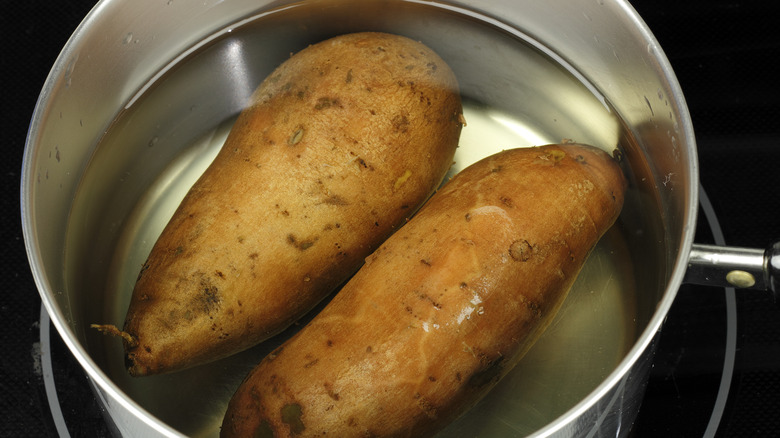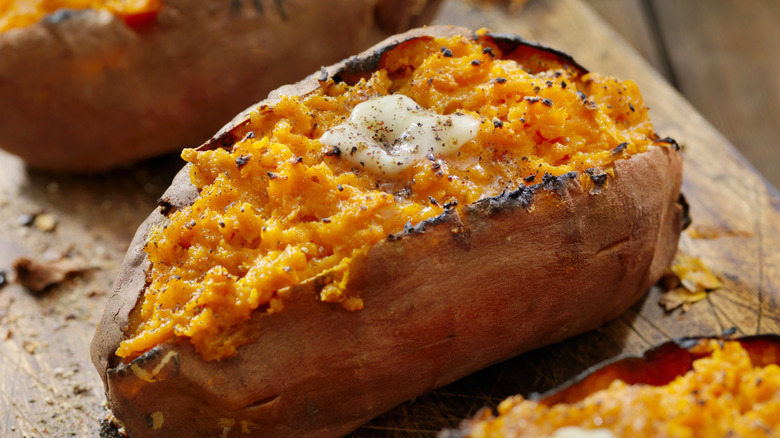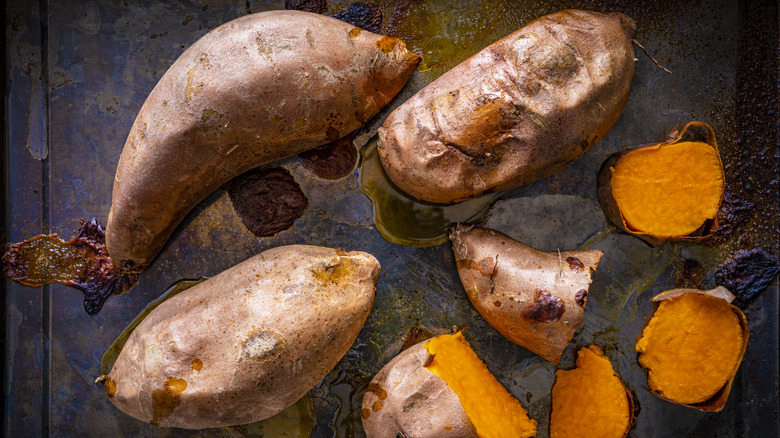Why It's Usually A Mistake To Boil Sweet Potatoes
Ah, sweet potatoes. They are nature's candy! No matter how you cook them, season them, or even eat them raw and thinly sliced, it's hard to go wrong with sweet potatoes. Because these tubers have natural sugars, there are ways we can maximize their flavor. And, there are also ways to drain away their flavor.
First, let's understand what's actually in sweet potatoes. According to the U.S. Department of Agriculture (USDA), raw, uncooked sweet potatoes are incredibly nutrient-rich, including vitamin A, vitamin C, potassium, manganese, and several B vitamins. They are a great source of dietary fiber, especially for the skin. Despite their sweet taste, these potatoes have an intermediate glycemic index (GI) level, meaning they are digested and absorbed fairly slowly, leading to a more gradual increase in blood sugar levels.
But, a lot of these benefits, including nutrients and taste, can be lost by boiling sweet potatoes. Baking them is the best way to preserve all their goodness. Here's why.
Bake, don't boil
Baking sweet potatoes instead of boiling them has many advantages that elevate both the flavor and nutritional profile of this versatile root vegetable. Yes, some recipes call for boiling them, like for a sweet potato casserole, but trust us, baking will ensure superior flavor.
Baking sweet potatoes caramelizes their natural sugars, especially when done whole. It intensifies their flavor and creates a richer taste compared to boiling, which can result in a watered-down, bland flavor. As the oven temperature rises (when baking), the molecular structure of the sugar molecules in the sweet potatoes begins to change. The heat causes the bonds between the sugar molecules to break, leading to the formation of new compounds. These compounds are responsible for the characteristic sweet and nutty flavor, as well as the golden-brown color, associated with caramelization.
Alongside caramelization, another reaction called the Maillard reaction also takes place during baking. This reaction involves the browning of amino acids and sugars present in the food, further contributing to the development of flavor and color.
These complex reactions cannot happen when the potato is boiled because caramelization does not happen. Furthermore, baking also results in a firmer texture and retains more of the potato's natural moisture compared to boiling, which can make it mushy or waterlogged if overcooked.
Understanding nutrition
According to a study published in Food Science and Human Wellness, sweet potatoes lose some nutrients no matter how they are cooked. Methods like boiling, steaming, and baking all have different benefits. The study finds roasting sweet potatoes retained more anthocyanins which are known for antidiabetic, anticancer, anti-inflammatory, antimicrobial, cardiovascular, and anti-obesity effects, according to a Food & Nutrition Research study, than other cooking methods. On the other hand, boiling sweet potatoes retained more beta carotene, an antioxidant. Nutritionally, it is best to enjoy sweet potatoes cooked in different ways to get the most benefits.
Baked sweet potatoes can be served whole, sliced or hasselbacked, mashed, or used in various dishes like salads, casseroles, or desserts, offering more flexibility compared to boiled sweet potatoes, which are just limited to a mushy mash. Sure, boiling may save you some cooking time. But, is it worth sacrificing all that flavor and goodness? We think not.


